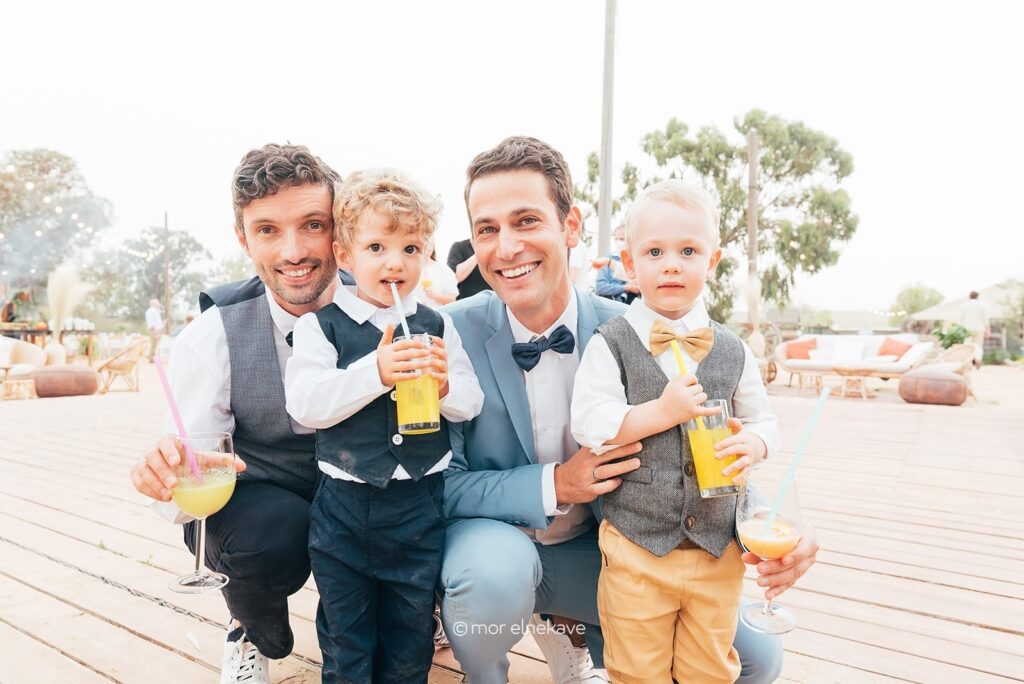Being a gay father makes me a criminal in parts of the EU, at the risk of imprisonment.
I’m not writing this in 1933, but in 2023. Current legislation in Italy attempts to criminalise couples who become parents via surrogacy even if it is legal in the country in which it takes place.
Surrogacy is the practice of a woman, choosing to carry a pregnancy for another family and with an embryo which is not hers. This arrangement keeps the genetic parents, not the surrogate, as the legal parents and guardians of the child, once born.
Up until now same-sex couples would travel to countries where surrogacy is possible, like the US. Soon, returning with a child’s birth certificate which bears two fathers might entail criminal charges. Whereas the Italian legislation may not mention same-sex couples explicitly, in practice gay men are the main target.
Italy is one country we could regrettably avoid visiting if we had no choice. But what about the recognition of our family in the rest of the EU? What if I can’t board a plane with one of my sons in my arms because the ground staff won’t recognise me as his father? Or what if I need to visit a hospital with one of my children in another European country?
The official papers stating my husband and I as the legal fathers of both our children are invalid in certain EU countries simply because we are gay; because a child cannot have two legal parents of the same sex.
The European Commission is now attempting to partially fix this abnormality with a new proposal on the recognition of parenthood between member states. The proposal would oblige all EU countries to legally recognise same-sex parenthood once it was established in one EU member state. As eloquently put by European President von der Leyen, “If you are a parent in one country, you are a parent in every country.”
This is a banality for my four-year-old twins. They know that wherever we may go, daddy will always be daddy (or daddies in our case). But what is obvious for my toddlers, still requires EU legislation to be enforced. This is not only about our dignity as a family, to be recognised and respected for who we are.
This is first and foremost about our ability as parents to protect our children and defend their interests, to fulfil our responsibility as parents.
Unfortunately, the proposed EU legislation does not go as far as the President’s speech. The Proposal does not suggest that if same-sex parenthood was legally recognised anywhere in the world, it would also be recognised across the EU. Instead, it suggests that only after parenthood was legally established in an EU country, other EU member states are obliged to recognise it.
This nuance is important because surrogacy is not possible anywhere in Europe. European Gay couples typically travel elsewhere in order to become parents via surrogacy (as adoption is almost impossible for same-sex couples).
If, upon returning home with their newly born child, the parents’ EU country only recognised (without legally establishing) the parenthood, let alone if their country does not recognise same-sex parenthood altogether, the child might remain stateless or have only one recognised parent. This, the new Commission proposal does not attempt to resolve. The best interest of the child would remain unprotected.
Is surrogacy ethical?
Surrogacy opponents caricaturise it as abuse of women’s rights, “commercialising their bodies”. I believe that the women’s right abusers are those who ban women from deciding for themselves whether they’d like to carry a pregnancy with a child of another family who is unable to conceive.
This is not only about same-sex couples. I have been contacted by heterosexual couples and even single women with fertility problems, who asked for advice on finding a surrogate for themselves. Surrogacy was their only path towards biological motherhood. In Europe, those aspiring mothers are also considered women’s right abusers. In Italy, they might soon go to jail.
To me, surrogacy is like a blood or organ donation. It is not ethical or unethical per se. It all depends on the context and the legal framework in which it is conducted. Harvesting a kidney against someone’s will is obviously a crime; yet, allowing a person to donate a kidney would be an act of altruism. The medical process might be identical; yet, the moral lesson is opposite. The same goes for surrogacy; the ethical question is not about the process but about the context and legal framework.
In the case of the US, where my children were born, there is a solid legal framework which approves a woman as surrogate, after having proved she is financially stable (excluding financial pressure), physically capable, psychologically sound, has her own biological children (aimed to ease the separation from the non-biological child she carries), and that the legal rights of all sides are well defined and protected.
Surrogates can make any decision that relates to their own health throughout the pregnancy and delivery, whereas we, the intended parents, make decisions concerning our biological children. In case of conflict, the surrogate’s health comes before that of the embryo.
In our case, we made every decision jointly, in a warm and respectful environment. Kristina, our incredible surrogate, had noble intentions and was eager to deliver our children healthy. We were full of gratitude and admiration for her courage and altruism.
The relationship we created with her, was not merely a contractual one but a lifetime bond with the woman we humbly invited to be their godmother. She said yes.
I believe that if we truly wish to protect the surrogates, we must legalise and regulate surrogacy here in Europe. Let us have a candid debate about the appropriate measures to ensure its fairness and ethics. Let us listen to surrogates’ voices rather than talk about ‘protecting’ them in a paternalistic manner.
The Commission’s proposal is not enough to resolve the administrative struggles and lack of recognition of same-sex parents in Europe. But it’s a step toward equality, recognition, and legitimacy of rainbow families.
Before the new proposal becomes law, it still requires unanimous approval of all EU member states in the Council (besides Denmark which has an op-out in this area), including Hungary and Poland. Hungary, of which I’m a citizen, has already announced its opposition to the Commission’s proposal.
Fortunately, my children are still too young to understand why anyone would refuse to see us as a family. One day I’ll explain to them that whichever way a European government votes, it cannot change their daddies’ commitment to love and protect them in every way we can. Writing this article is part of my way of doing it.


